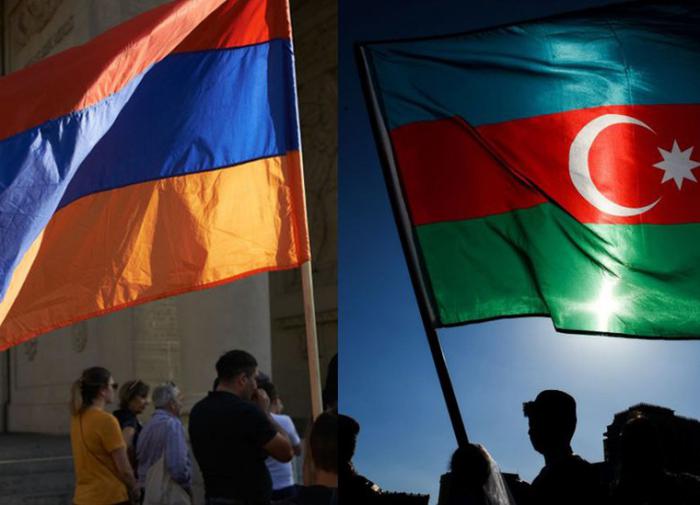Armenia willing and able to take 'small revenge' on Azerbaijan
The choice that Armenia faced after it was defeated by Azerbaijan in the second Karabakh war was worse than one could imagine. Iran showed up as a salvation.

After the defeat in the war, Armenia faced a dilemma:
- either to try to improve relations with the Turks, who massacred the Armenians at the beginning of the last century,
- or trust Russia again, which does not (and did not) have any strategy in the settlement of the Nagorno-Karabakh conflict.
The problem is about the preservation of the uncertainty of the status of Nagorno-Karabakh: will the sovereignty and custody of the region be returned to Azerbaijan or will another model of governance be chosen?
This ambiguity serves the basis of the Moscow-mediated ceasefire agreement. The roots of discord between Armenia and Azerbaijan have not been eliminated. Everything has been extremely unfavourable for Armenia this year, until Iran showed up with its interests.
Reasons behind Iran's arrival in the Transcaucasus
A year after the end of the war, Tehran realised that a new geopolitical reality has emerged on its northern border, with strong Azerbaijan and weakened Armenia.
Iran sees numerous problems in the strengthening of Azerbaijan. First, Azerbaijan has very close ties with Israel. Azerbaijan supplies 40 percent of its oil to Israel and actively buys modern weapons from Tel Aviv. The Persians are confident that their nuclear scientist Mohsen Fakhrizadeh was assassinated by Israeli drones launched from the Sitalchay airbase, located 70 kilometers north-west of Baku.
Hossein Abdollahian, the Foreign Minister of the Islamic Republic of Iran, called Israel's "active" presence in Azerbaijan a "threat to Iran's security."
Secondly, as orientalist and Iranianist Karine Gevorgyan told Pravda.Ru, the conflict between Iran and Azerbaijan has been growing due to long-standing claims that the Iranian Shiites have in relation to the Sunnisation of Azerbaijan, conducted with the participation of Turkey.
"The ancestors of those who live in today's Azerbaijan were included in the Iranian civilisation. Moreover, 120-150 years ago they despised the Ottomans, the Turks that is, in connection with the monstrous genocide of the Shiites that had taken place in the Ottoman Empire. Yet, the Turks managed to make them change their minds completely, and this is where Iran sees a threat for its interests, because the corresponding propaganda has been active in Iranian Azerbaijan," the political scientist said.
We would like to add here that there are up to 30 million ethnic Azerbaijanis living on the territory of Iranian Azerbaijan, while Azerbaijan is a 10-million-strong nation.
Thirdly, Iran has noticed an increase in military exercises that Turkey and Azerbaijan hold near its borders, including in the Caspian Sea.
Based on the above-mentioned reasons, it becomes obvious why Iran actively intervened in Transcaucasian affairs.
Iran to provide alternative to Zangezur corridor
According to Karine Gevorgyan, Armenia will suffer from the post-traumatic syndrome for a long time. On Iranian social networks, many discuss the news about the military agreement between Iran and Armenia about the deployment of Iranian military advisers in Armenia.
In addition, Iran announced its readiness to build a new transit road (and to protect it) through Armenia to Georgia and further through the Black Sea to Europe. The new highway will run parallel to the Goris-Kapan highway. About 21 kilometers of this highway, according to the armistice agreement, were assigned to Azerbaijan, and Iranian trucks have to pay tolls when passing the checkpoint.
The new road runs in the Syunik region, which Armenia is afraid of losing completely.
The so-called Zangezur corridor runs along the same Syunik region, along which Turkey decided to create a transport corridor to Azerbaijan and further to Central Asia through the Caspian Sea.
This corridor, according to the ceasefire agreement, was supposed to unblock regional communications that branch out to Iran. However, as long as agreements do not indicate the routes, along which communications should be unblocked, the new Iranian highway has good chances to become a real alternative to the Zangezur corridor. This alternative does not bind Armenia either to agree to mutual recognition of borders or sign a peace treaty with Azerbaijan.
Armenian Foreign Minister Ararat Mirzoyan stated at the talks in Tehran that there were no agreements on the Zangezur corridor at all.
"Armenia declared and continues to declare that it is ready to discuss the opening of communications. Azerbaijan is trying to misinterpret the process, resorting to the so-called Zangezur corridor, about which there was no agreement. All this, as well as Azerbaijan's encroachments on the sovereign territory of Armenia put our efforts to ensure stability and security in the region in jeopardy. In this regard, we highly appreciate Iran's position regarding the territorial integrity of Armenia and the inviolability of its borders," the minister said.
Karine Gevorgyan stressed in an interview with Pravda.Ru that Iran seriously intends to become a major transit world hub. Therefore, Tehran will not turn down communications either through Syria, Turkey, Lebanon, or Russia.
The Zangezur corridor can only ensure the movement of military cargo between Turkey and Azerbaijan, therefore, this communication, in fact, has only a military-political purpose.
If Armenia proves to the "world community" that it can unblock communications jointly with Iran, rather than with Turkey, it will be Armenia's small revenge to Azerbaijan.
Subscribe to Pravda.Ru Telegram channel, Facebook, RSS!


